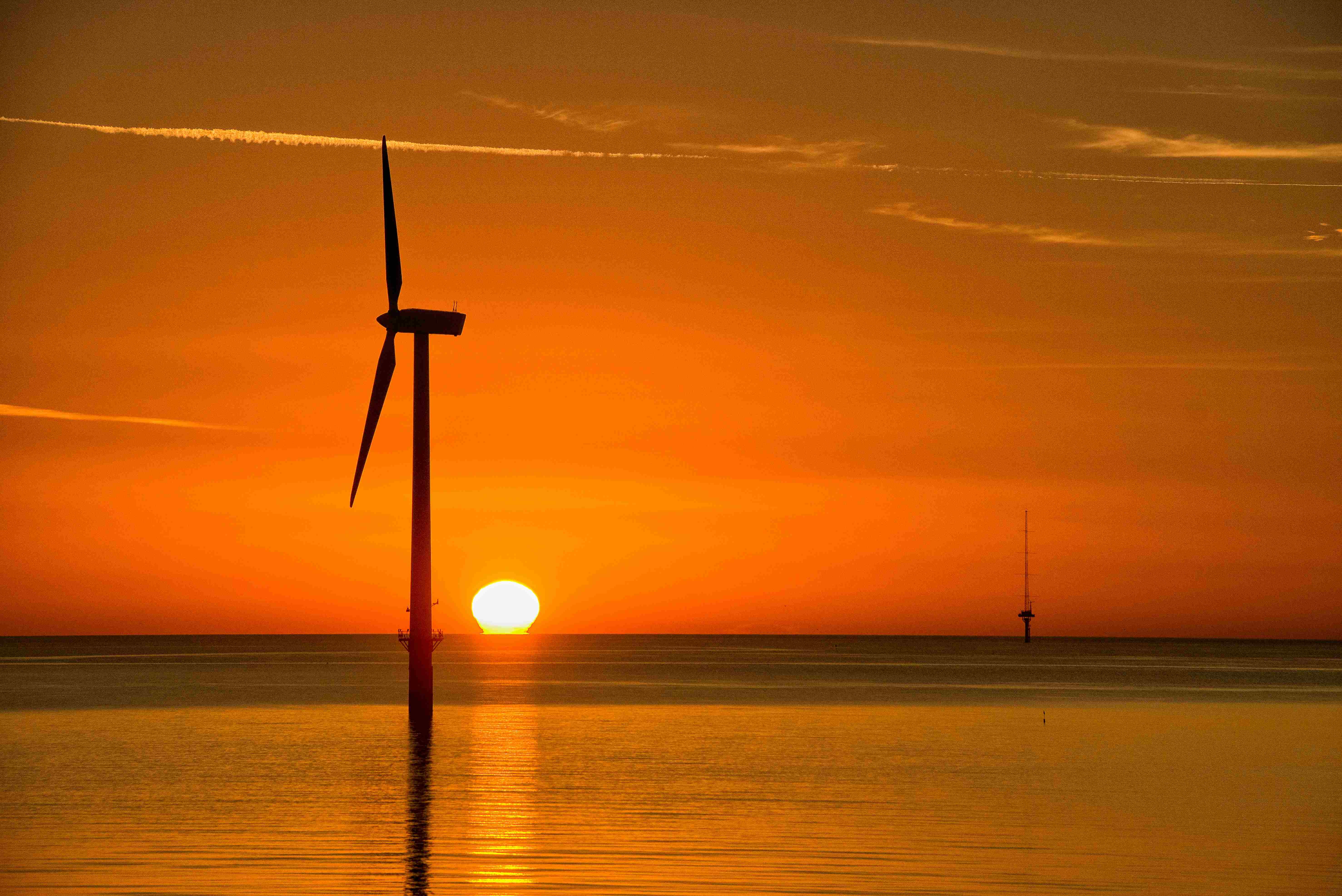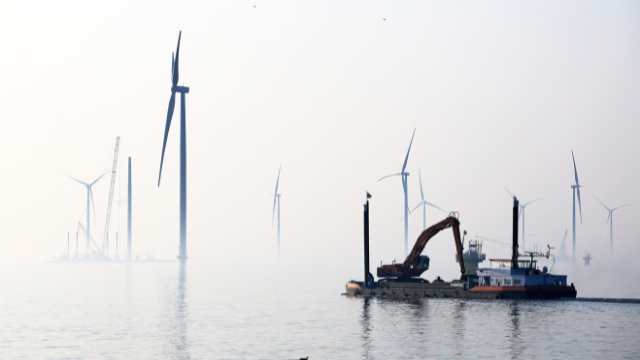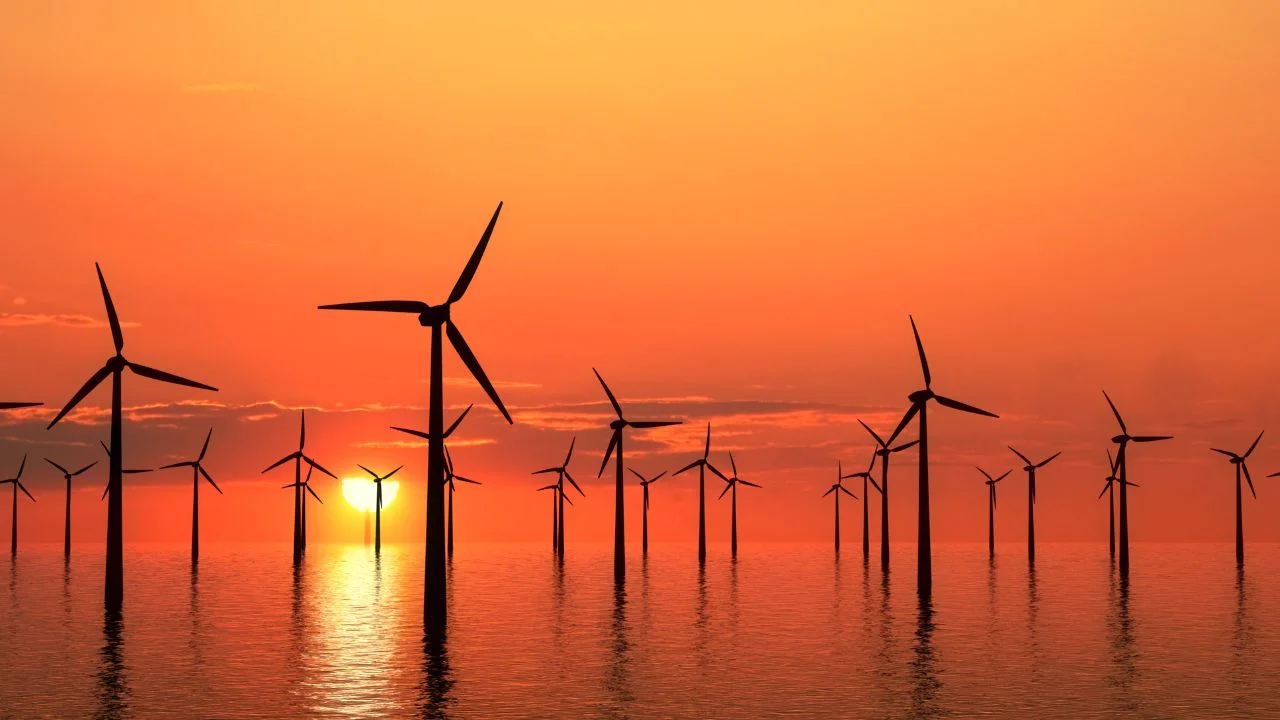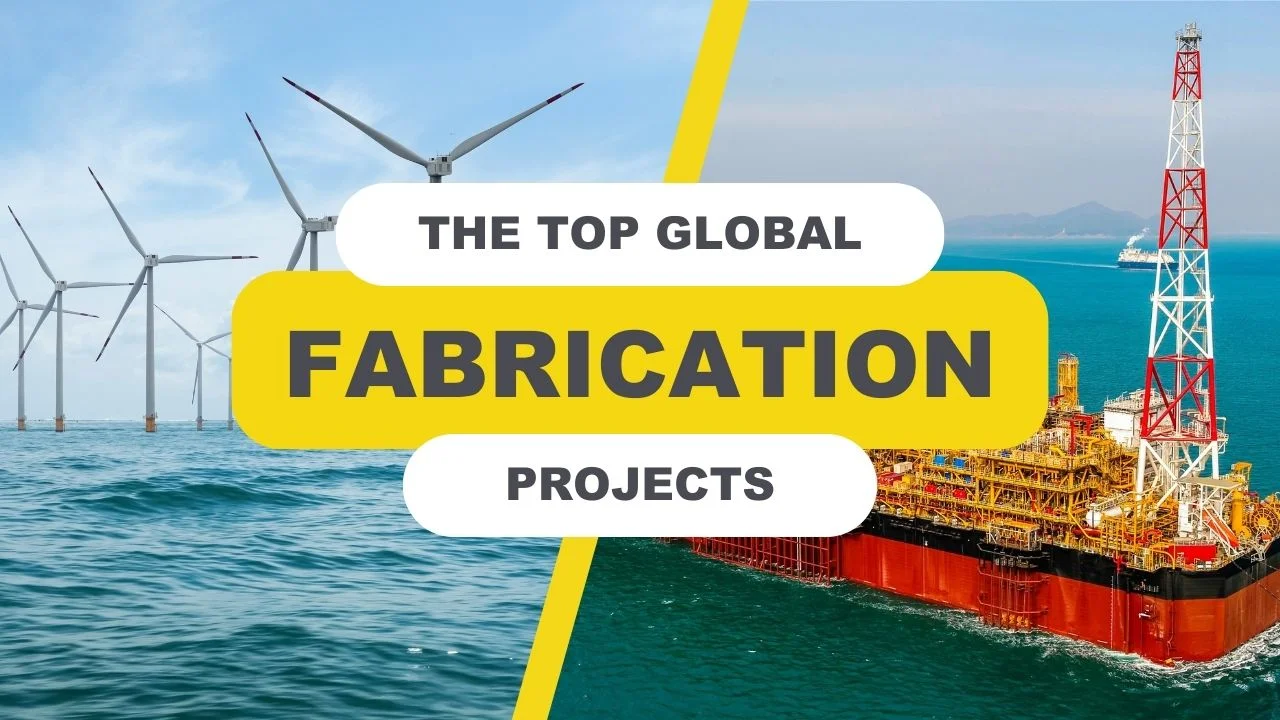How to Become an Offshore Wind Turbine Technician
27 Nov, 202310 minsBy 2032, the global offshore wind energy market is forecasted to rise from the over $5 billi...

By 2032, the global offshore wind energy market is forecasted to rise from the over $5 billion recorded in 2022 to over $31 billion. It's also expected that 100,000 offshore wind jobs will be created by 2030, with a core part of these roles coming in the form of offshore wind turbine technician jobs. But what is the role of an offshore wind turbine technician, and how do you become one?
We’ll provide an answer to this question and more in our guide on how to become an offshore wind turbine technician.
In this guide, we’ll explore:
- What does an offshore wind turbine technician do?
- How to become a wind turbine technician
- Is a renewable energy wind turbine technician a good career?
What does an offshore wind turbine technician do?
The role of wind turbine technicians operating the offshore wind energy space involves various responsibilities, making it a challenging yet rewarding career choice. These professionals are primarily responsible for contributing to installing, inspecting, and maintaining wind turbines, ensuring they operate efficiently to support renewable energy generation.
Wind turbine technicians are involved in various phases of an offshore project, including pre-installation duties, assessing quality measures and overseeing safety procedures. This is done to ensure every aspect of the project aligns with the relevant regulations and industry standards. Offshore wind technicians also actively participate in the commissioning and troubleshooting of wind turbines and support a range of service tasks, such as blade repairs.
Responsibilities of an offshore wind turbine technician are often conducted in remote areas where overcoming weather conditions can be challenging. Given the demanding nature of the work, physical fitness is crucial for the role. Offshore wind energy jobs like this also entail long rotations, with offshore projects following a two-week on-site cycle with two weeks off.
Offshore wind turbine technicians work across the three main sections of a wind turbine:
Nacelle: This is the top section of the turbine where the electronics are located. Offshore wind turbine technicians often base themselves here, addressing issues with the gearboxes or generator.
Tower: The tower is the spine providing structural support for the wind turbine. Here, offshore technicians often conduct tasks related to the tower's concrete and steel components.
Blades: Finally, the wind turbine technician will conduct regular inspections and repairs of the three large blades crucial for generating this renewable energy source. Technicians will maintain the rotor inside the turbine and ensure the blades operate in the expected spinning motion to generate electricity efficiently.
We touched on the fact that offshore wind turbine technicians must be physically fit to succeed in the role. However, top talent within this niche is also expected to have these skills and qualities.
- Technical skills and interests in relevant areas such as mechanics, electrics, automotive, energy, and construction
- Problem-solving skills.
- The ability to work individually and as part of a team spirit
- Strong work ethic
- Capable of adapting to different environments
- Ability to communicate effectively
In summary, offshore wind turbine technicians are essential to the renewable energy sector, contributing to sustainable electricity production through efficient installation, inspection and maintenance of turbines for the world's top offshore wind projects.

How to become a wind turbine technician
As you start applying for the latest offshore wind energy jobs, it's essential to ensure you and your CV are equipped with the necessary qualifications and certifications, have undertaken the relevant training and courses or have an already established technical background, making you suitable for a role in offshore wind energy.
Knowing how to become a wind turbine technician can be considered complex. So, let's explore the key things you can do to further your chances of becoming a wind turbine technician.
Obtain the necessary qualifications and certifications
Regarding how to become a wind turbine technician, one of your first considerations should be pursuing high-level electronic, engineering or mechanical qualifications. These fields are closely aligned with the responsibilities of offshore wind turbine technicians, allowing you to discover the technical responsibilities of the role. Investing in your education and skill development can prepare you for the challenges of the job and make you a sought-after candidate in this rapidly growing industry.
You could obtain the necessary technical qualifications and certifications through courses provided by the following accreditations:
- Higher National Certificate (HNC)
- Higher National Diploma (HND)
- National Certificate (NC)
- National Qualification (NQ)
To enrol in the relevant technical courses offered above, you'll need to meet the entry requirements, including proficiency in mathematics, English, and science subjects. The technical courses these accreditations provide can give you the foundational knowledge required to excel in engineering studies related to offshore wind turbine technician jobs.
You can find more advanced and specialised educational routes to becoming a wind turbine technician by pursuing renewable energy, electrical, mechanical, or electrical power engineering degree. These high-level and industry-renowned qualifications offer in-depth technical knowledge that could lead to practical experience through internships, allowing you to gain a competitive edge in the busy job market.
Additionally, you could obtain certifications from the highly-regarded and well-respected Global Wind Organisation (GWO). Training via the GWO is highly valued in the offshore wind sector, with courses covering essential aspects of safety and technical training to ensure technicians are well-equipped to manage the challenges of working in offshore environments.
As the global offshore wind industry is forecasted to grow at a CAGR of over 18% between 2023 and 2032, holding a GWO certification can boost your chances of securing coveted positions within the offshore wind energy space.

Consider enrolling on relevant training and apprenticeship courses
Another alternative pathway for talent seeking support in becoming a wind turbine technician is enrolling in relevant training and apprenticeship courses. These programmes offer passionate people a comprehensive understanding of the technical aspects of the role alongside hands-on experience of learning the day-to-day responsibilities of the job.
For example, undertaking a Level 6 (equivalent of a bachelor’s degree) Wind Turbine Operation and Maintenance apprenticeship at SCQF (Scottish Credit and Qualifications Framework) is a standard route. These wind turbine apprenticeships may require you to have qualifications in English, mathematics, and a science subject at a national grade 4 or 5.
Wind turbine technician apprenticeships typically take two years to complete. Throughout the course duration, apprentices receive coaching and training that delves into the intricacies of the role, allowing individuals to gain essential experience in real-world scenarios. This practical approach to learning is invaluable for building the necessary skills for success in the offshore wind industry.
The demand for skilled talent in offshore wind has prompted industry leaders, including companies like Orsted and MHI Vestas, to invest in internal talent development through apprenticeship schemes. Recognising the potential shortage of qualified workers in the future, these companies actively foster skilled staff through apprenticeship courses.
Another viable route to becoming an offshore wind turbine technician is through a City and Guilds course in wind turbine technology and maintenance. Completing this course opens avenues for further study or entry into an apprenticeship programme.
Although these courses may require you to travel to receive this type of education, several institutions in Scotland, such as those in Ayrshire, Dumfries, Fife, and Galloway, offer these courses tailored to wind turbine technology and maintenance. This option would give you a structured curriculum designed to develop your theoretical understanding and technical skills needed for a successful career in the wind energy industry.
You have a technical background suitable for offshore wind energy
If you possess a mechanical, electrical or engineering background and relevant experience in the energy industry, you're in a prime position to explore opportunities in offshore wind energy. Many energy firms seeking to transition into renewables are becoming more open to candidates with a track record of working on projects that utilise skills and technical expertise similar to offshore wind technician jobs.
Returning to our previous point on enrolling on relevant training and apprenticeship courses, companies are increasingly offering retraining and upskilling courses for individuals from technically related fields seeking a career transition to offshore wind.
This strategic approach is helping to address the current demand for skilled technicians. It ensures a sustainable pipeline of qualified professionals in the evolving landscape of offshore wind energy while allowing willing talent to make the jump into renewable energy.
So, even if you lack experience specifically in the wind industry, if you have a relevant technical background, you could be brought up to speed with the intricacies of an offshore wind technician after some related training.
Staying ahead of the latest technology advancements and industry standards within the wind energy niche will make you an asset to potential employers. To further solidify your position in the offshore wind industry, consider ongoing professional development and seek out businesses offering specialised courses or workshops focusing on emerging trends and technologies within the renewable energy sector.
Is a renewable energy wind turbine technician a good career?
Undoubtedly, offshore wind careers hold immense promise, especially with the current global shift towards the energy transition to renewable sources. As nations focus on reducing their reliance on fossil fuels, the demand for skilled individuals who can operate, maintain, and repair wind turbines is on the rise.
Here's why a career as a wind turbine technician is a good career choice:
- High demand: As the world continues to move towards more sustainable and cleaner power sources, renewable energy technicians play a vital part in ensuring the efficiency and reliability of wind turbines. As the need for skilled professionals rises, it provides job security for wind turbine technicians for years to come.
- Growth in offshore wind jobs: According to the Global Wind Organisation, over 574,000 technicians will be needed by 2027 - close to 43% of these positions will require new talent to enter the renewables industry. In the UK alone, offshore wind jobs are projected to grow by 100,000 by 2030. This surge is driven by ambitious climate targets and the looming energy crisis.

Global investment in offshore wind reached record highs of over $76 billion in 2023. China maintained its position as a world leader in the offshore market, followed by the UK and the US. The UK has committed substantial investments - around £200-250 billion - over the next decade to develop offshore wind technologies and wind farms. This substantial financial commitment indicates a flourishing job market in the offshore wind industry.
- Competitive salaries: A common question candidates ask when applying for roles is, ‘How much do offshore wind turbine technicians get paid?’ Of course, the answer depends on your experience and the employer, but according to Indeed, an offshore wind turbine technician’s salary is £30,000. Offshore jobs state the average annual salary for wind turbine technician jobs in the US to be around $60,000.
- Contributing to a sustainable future: A career in offshore wind allows you to make a tangible difference to the world and your loved ones. With climate change posing significant challenges, contributing to a renewable energy source like offshore wind provides a sense of purpose. Wind turbine technicians actively participate in mitigating the impact of climate change, making their work meaningful and impactful.
- Exciting career pathways: The offshore wind industry is not just a job; it's a career with exciting possibilities. As the sector sees continuous growth, this opens up new career development and progression pathways. Wind turbine technicians can explore diverse alternative and renewable energy jobs as the industry evolves, from managerial roles to executive positions in the renewable space.
Final thoughts on becoming a wind turbine technician
Overall, an offshore wind turbine technician career is more than just a job - it's an opportunity to be part of a transformative industry that is contributing to a sustainable future. The combination of high demand, growth in the sector, job and security, and the chance to positively impact the world makes wind turbine technology a compelling and rewarding career choice.
Whether you embark on your journey to becoming a wind turbine technician through formal education or apprenticeships or leverage your existing technical background, the wind energy industry welcomes individuals with diverse pathways. With offshore wind jobs projected to surge, with a growth of 100,000 positions expected by 2030 in the UK, there has never been a better time to consider a career in wind energy.
If you found this guide useful and want more advice on a career in offshore wind, read our piece on the 5 Tips To Start Your Offshore Wind Career.
Looking for the latest offshore wind energy jobs?
If you're considering becoming a wind turbine technician in the offshore space, we can help you kickstart your career. As specialists in the renewable and wind energy industry, we can connect you to opportunities with the world’s leading innovators and biggest projects across the globe. So, if you're looking for a partner to help you secure your future role, register for the latest offshore wind energy jobs today.
Alternatively, contact us today for more information on how we support candidates in the wind energy industry.










